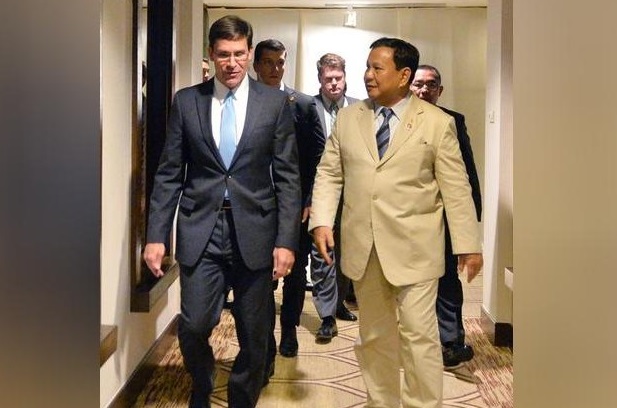
Indonesian Defence Minister Prabowo Subianto’s visit to the United States (15–19 October) for talks with US Defense Secretary Mark Esper on regional security and defence cooperation suggests a great deal about the Trump administration’s agenda and Prabowo’s own—even if their joint statement on their 16 October meeting at the Pentagon actually revealed nothing of substance. The visit came after an invitation from Esper and a decision by the State Department to grant Prabowo a visa, something he had long been denied on the grounds of numerous human rights abuses he is alleged to have committed during his time as a senior military officer in the New Order era of his then father-in-law, President Suharto.
As anyone who has followed Indonesian affairs for any length of time would know, to describe Prabowo as colourful would be to make an understatement of colossal proportions, and simply to dismiss the allegations of his past behaviour as baseless would be either callous or naive. Besides being accused of atrocities during his time as an officer in the Special Forces Command (Kopassus) in East Timor, Prabowo is alleged to have been involved in fomenting and backing the pogroms visited upon Indonesia’s ethnic-Chinese community during the turmoil preceding Suharto’s toppling. He was accused of kidnapping and torturing pro-democracy activists, for which the armed forces (TNI) commander, Wiranto, claimed to have drummed him out of the military.
None of these alleged offences, however, ever translated into criminal charges against Prabowo in Indonesia. Nor have they prevented him from resurfacing as one of the most enduring political characters in the post-Suharto political drama, during which he has repeatedly tried and failed to win the presidency. His narrow 2014 defeat at the hands of the man whose rise he himself had earlier helped engineer, Joko Widodo, was especially noteworthy for his reaction, which included baseless allegations of widespread cheating and threats that he would seek a judicial challenge to the result.
While heavier than the earlier one, his second loss to Widodo last year neither terminated his powerful presence in Indonesia’s political firmament nor diminished his belief in his manifest destiny as the nation’s president-in-waiting. This reality was not lost on Widodo, who, as determined as ever to reduce constraints on his own authority and objectives, was only too ready to bring him into his cabinet and give him the portfolio he desired, securing the support of Prabowo’s party, Gerindra, in the legislature.
If Widodo’s decision was all about his own political interests, it nonetheless ensured that Indonesia has ended up with arguably its most strategically astute defence minister for more than a decade. For all his alleged offences and manifest character flaws—his ego and reputed propensity for tantrums, for example, are positively Trumpian—he is unquestionably intelligent, sophisticated, cunning and better attuned than anyone in Jokowi’s cabinet to the geopolitical realities and strategic challenges that Indonesia faces now and into the future, especially in its northern maritime domain.
That doesn’t necessarily mean that he is well equipped temperamentally and ethically to position Indonesia to manage those challenges effectively, as his reported interest in buying second-hand Austrian Eurofighters to add to Indonesia’s pre-existing mélange of Russian and US fighter jets would lead one to question. By flagging this proposition, however, he may (wittingly or otherwise) prompt the Trump administration to look at how the US might offer him a better option than pre-loved Typhoons (indeed, a reference to the subject of defence acquisitions was the only noteworthy part of the Esper–Prabowo joint statement). And while his visit should not be read as a sign that Indonesia is looking to move away from its enshrined ‘free and active’ foreign policy towards a posture favouring the United States over China, Prabowo is surely using it to signal to Beijing that Jakarta supports Washington’s maintaining of at least a powerful balancing role in the region’s affairs.
The timing of his visit also suggests that he’s strategically adept in another sense. Nobody would be more alert to President Donald Trump’s diminishing prospects of re-election and the consequences for Indonesia–US defence relations were a Biden administration unwisely to restore Prabowo’s pariah status. Already Democrat Senator Patrick Leahy has joined the chorus of Indonesian and international human rights organisations and others condemning the Trump administration’s moves towards Prabowo. If more pragmatic members of Joe Biden’s foreign policy circle are likely to counsel him against doing what would seriously jeopardise Washington’s own interests in its relationship with Southeast Asia’s most populous and strategically significant nation, it’s equally likely that Prabowo would nevertheless recognise that no time would be better than now to extract favourable arrangements for his own agenda.
As for Australia, Canberra can only urge any incoming Biden administration to maintain at least this element of its predecessor’s policies. Dealing with Prabowo invariably necessitates holding one’s nose. But the Trump administration’s argument that he should be treated the same way as any other appointee of a twice-elected president—whom, incidentally, leaders like our own praise (rightly or not) as a great friend and committed democrat—is sound.
Moreover, nose-holding is something that both US and Australian governments of all persuasions have rarely had much difficulty in doing when our nations’ strategic interests are so much at stake, including with respect to some of Indonesia’s other defence ministers and TNI commanders. China, which Prabowo lost no time in visiting in December last year, obviously has no such qualms. Nor has Russia, which would have noticed Prabowo’s interest in buying more fighters and might well be ready to offer him mate’s rates on a few more Sukhois.
To ostracise Prabowo again would not only be imprudent. It would rightly stand condemned as monumentally myopic should he indeed fulfil his self-identified destiny at Indonesia’s next presidential elections in 2024.

